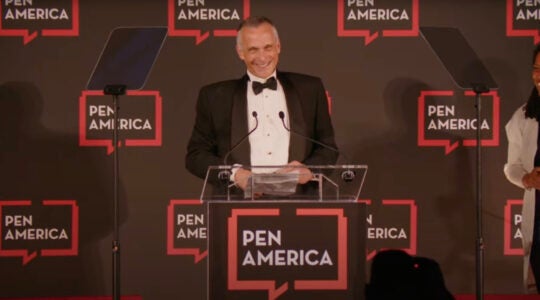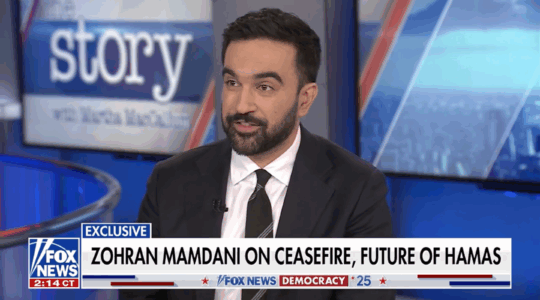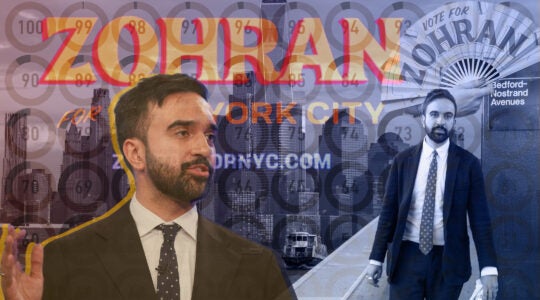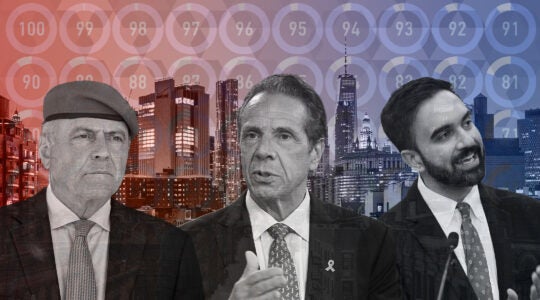A day after deflecting questions on Fox News about whether Hamas should “lay down their weapons and leave the leadership in Gaza,” New York City mayoral frontrunner Zohran Mamdani offered an answer.
“Of course I believe that they should lay down their arms,” Mamdani said. “I’m proud to be one of the first elected officials in the state who called for a ceasefire, and calling for a ceasefire means ceasing fire. That means all parties have to cease fire and put down their weapons.”
Mamdani’s comment came as the city’s three main mayoral candidates convened Thursday night for the first general election debate, which focused extensively on Jewish issues including Israel and antisemitism.
Mamdani, a democratic socialist who is the Democratic nominee, faced questions about his views on Israel, Hamas and whether Jewish New Yorkers could count on him to combat antisemitism. As he has throughout the campaign, he sharply criticized Israel, following his response about Hamas to harshly criticizing Israel’s actions in Gaza, both before and after Hamas’ Oct. 7, 2023 attack.
“The reason that we call for that [ceasefire] is not only for an end of the genocide, but also an unimpeded access of humanitarian aid,” he said. “I, like many New Yorkers, am hopeful that this ceasefire will hold. I’m hopeful that it is durable. I’m hopeful that it’s just.”
He continued, “And for it to be just, we also have to be hopeful that it addresses the conditions that preceded this — conditions like occupation, like the siege and apartheid.”
Unlike the Democratic primary debates, during which Mamdani was an underdog candidate, the Queens state Assembly member was the favorite this time around. His opponents, former Gov. Andrew Cuomo and Republican Curtis Sliwa (sans his trademark red beret), repeatedly challenged his ability to represent Jewish New Yorkers.
“Jews don’t trust that you are going to be there for them when they are victims of antisemitic attacks,” Sliwa charged.
“I agree, by the way,” Cuomo chimed in, in a rare moment of unity.
Cuomo, who is polling second and has garnered endorsements from several Jewish groups since Mayor Eric Adams dropped out, said, “There are a lot of Jewish New Yorkers who support me because they think you’re antisemitic.”
Asked if he agreed with those accusations, Cuomo said, “I don’t make those judgements about people — are you a racist? Are you an antisemite?” But Cuomo pointed to Mamdani “not condemning ‘globalize the intifada’” as a reason that some Jewish New Yorkers hold that belief.
Mamdani, who has drawn criticism for declining to condemn the phrase, spoke about his conversations with Jewish New Yorkers that eventually led him to “discourage” its, which he added that he himself does not use.
“It’s in those conversations that I learned that this phrase evokes many painful memories — memories of bus attacks in Haifa, restaurant attacks in Jerusalem,” he said, repeating comments he has made before. “I heard from a rabbi about their roommate who was killed on one of those buses.”
The candidates spoke about Jewish safety amid rising antisemitism.
Sliwa touted his record of protecting Jewish communities with the Guardian Angels during the Crown Heights riots in 1991 and in Williamsburg in 2019 following a series of assaults on Orthodox Jews.
Cuomo attacked Mamdani for what he characterized as his declining to recognize Israel’s right to exist as a Jewish state, and called the Democratic nominee a “divisive personality.” (Mamdani countered that he has said “time and time again” that he recognizes Israel’s right to exist, but “would not recognize any state’s right to exist with a system of hierarchy on the basis of race or religion,” pointing to Saudi Arabia as another example.)
Mamdani, meanwhile, said he will “be a mayor who finally addresses” Jewish New Yorkers’ fear of living in the city, “not through the theatrics of politics on this stage, but through action.”
“I’ll do that by ensuring that we have police officers outside synagogues on the High Holy Days,” Mamdani said, before the moderator moved to the next question.
Mamdani and Cuomo spent much of the debate trading barbs, while Sliwa sought to stand out from Cuomo as the best challenger to Mamdani. Sliwa was complimentary of Trump’s peace deal between Israel and Hamas, saying the president “should’ve been applauded.”
“Give credit where credit’s due — he’s brought peace to Gaza,” Sliwa said.
Cuomo countered that he did “applaud President Trump and his administration” for the deal, but positioned himself as the best candidate to take on Trump.
“You’re not going to stand up to Donald Trump,” Cuomo said to Sliwa. He then used a Yiddish term to get his point across to Mamdani: “And you can’t stand up to Donald Trump, who’d knock him right on his tuches.”
One rare point of overlap between Mamdani and Cuomo was that they each spoke positively of police commissioner Jessica Tisch, who is Jewish. Both have indicated openness to having her remain on the job.
“I agree with Commissioner Tisch in that we do not need the National Guard here in New York City,” Mamdani said.
Cuomo, meanwhile, said, “I think Commissioner Tisch is doing a very good job, I would trust her,” when explaining why he, unlike Mamdani, would leave the commissioner on the Civilian Complaint Review Board.
The candidates were each questioned about whether they would boycott any of the city’s many parades. While Cuomo and Sliwa both insisted that they would not boycott any, Mamdani sidestepped the question.
“There are many parades that I would not be attending because I’d be focusing on the work of leading the city,” Mamdani said, though he declined to specify which ones he would miss.
New York City mayors have historically attended the city’s annual Israel parade; Mamdani has not commented about whether he would attend the parade as mayor. His campaign has indicated that he would not seek to prevent the parade, a fear that some pro-Israel New Yorkers have expressed.
Mamdani was also asked about whether he would continue to participate in pro-Palestinian protests, as he did in the months after Oct. 7 while serving in the State Assembly.
“If I’m elected, I’ll be the mayor,” Mamdani responded. “And I’ll be leading the city from City Hall.”
JTA has documented Jewish history in real-time for over a century. Keep our journalism strong by joining us in supporting independent, award-winning reporting.





